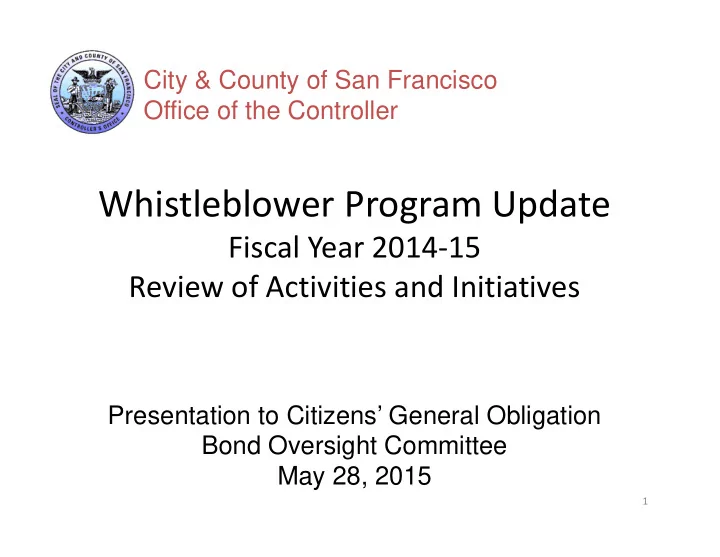

City & County of San Francisco Office of the Controller Whistleblower Program Update Fiscal Year 2014 ‐ 15 Review of Activities and Initiatives Presentation to Citizens’ General Obligation Bond Oversight Committee May 28, 2015 1
Whistleblower Program Authority The authority for Whistleblower Program investigations is derived from statute and regulation: – California Government Code 53087.6 – San Francisco Charter Appendix F – Campaign and Governmental Conduct Code Article IV 2
Matters Appropriate For Investigation The Whistleblower Program shall investigate or otherwise attempt to resolve complaints concerning: – The misuse of city funds. – Improper activities by city officers and employees. – Deficiencies in the quality and delivery of government services. – Wasteful and inefficient government practices. 3
Referral of Certain Complaints The Whistleblower Program shall refer the following complaints: – Those which another city department is required by federal, state, or local law to adjudicate. – Those which may be resolved through a grievance mechanism established by bargaining unit or contract. – Those involving violations of criminal law. – Those subject to an existing investigation. – Those which allege violations of governmental ethics laws. 4
Whistleblower Program Importance and Benefits • A fraud hotline is a critical internal control that is often noted as an operating and credit rating strength when well implemented by a municipality. • The Whistleblower Program allows complaints to be submitted anonymously and confidentially. • Whistleblower Program investigations: – Stop improper conduct and prevent further violations. – Reveal all of the relevant facts so that management can make a fully informed decision as to how best to proceed. 5
Complaints Received By Quarter 90 80 79 79 80 73 73 72 68 70 63 60 51 50 FY 14 ‐ 15 FY 13 ‐ 14 40 FY 12 ‐ 13 30 20 10 0 Q1 Q2 Q3 6
Fiscal Year 2014 ‐ 15 Complaint Activity Quarter 3 Quarter 2 Quarter 1 Open Complaints at Beginning of Quarter 55 56 64 New Complaints Received 68 73 80 (Complaints Closed) 55 74 88 Open Complaints at End of Quarter 68 55 56 7
Fiscal Year 2014 ‐ 15 Overview – Age of 55 Complaints Closed in Quarter 3 30 25 25 19 20 15 10 10 5 1 0 Less than 30 Days 31 ‐ 90 Days 91 ‐ 180 Days 181 ‐ 270 Days 8
Fiscal Year 2014 ‐ 15 Overview – Age of 68 Complaints Open at the End of Quarter 3 30 25 25 19 20 18 15 10 4 5 2 0 Less than 30 Days 31 ‐ 90 Days 91 ‐ 180 Days 181 ‐ 270 Days 271 ‐ 360 Days 9
Fiscal Year 2014 ‐ 15 Overview – Complaints Investigated and Closed Total Quarter 3 Quarter 2 Quarter 1 Complaints 155 38 55 62 Investigated and Closed Complaints Resulting in 45 11 21 13 Corrective/Preventive Action 29% 29% 38% 21% 10
Closed Complaints • Investigated and Closed – Substantiated complaints • Evidence is sufficient to support that a violation occurred. – Unsubstantiated complaints: • Evidence does not support that the allegation occurred. • Incident occurred but it does not violate any rule or regulation. • Can sometimes result in preventive action taken. • Complaints Referred to Department With Charter Jurisdiction – Complaint was referred to the city department with charter ‐ granted jurisdiction over the issue (for example, the Ethics Commission, City Attorney, or District Attorney). • Not Enough Information – Insufficient information to investigate. For example, no indication of department, employee(s) involved, or vehicle number. 11
Closed Complaints • Outside of Jurisdiction – Issue falls within the jurisdiction of federal, state, or other noncity government agency or is a suggestion or general complaint about decisions that are within management’s discretion. • Merged With Previous Complaint – Complainant provided information for a complaint that is already under investigation or was previously investigated by the Whistleblower Program. 12
Fiscal Year 2014 ‐ 15 ‐ Initiatives Employee Outreach • Continued outreach and education to city employees through employee presentations. • Citywide employee outreach occurred Quarter 3. – Departments were required to distribute Whistleblower Program contact information to all city employees. – Departments were also required to post a notice of whistleblower protections in locations that are conspicuous and accessible to all employees. – Issued investigative guidelines for department liaisons. 13
Fiscal Year 2014 ‐ 15 ‐ Initiatives Fraud Hotline Webinar Series • Purpose: To create a forum that encourages dialogue and collaboration on best practices for fraud hotlines. • Next webinar ‐ How to “Steer” Your Hotline Calls • Scheduled for June 11, 2015 • Topics covered in FY 2014 ‐ 15: • Fraud Hotlines in a Social Housing Environment • Proactive Fraud Detection Through Data Analysis • Leveraging IT to Support a Hotline Program 14
Fiscal Year 2014 ‐ 15 ‐ Initiatives Complainant Survey • Survey went live on October 1, 2014. • Two responses received. • Survey promoted in the following venues: • Website • Quarterly reports • Complaint receipt and closure correspondence • Employee outreach communications 15
Recommend
More recommend